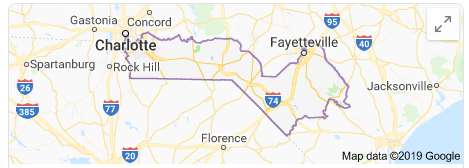By Jim Ellis

North Carolina’s 9th Congressional District
The special election is necessary because no winner was officially declared in the 2018 general election due to voter fraud accusations in one county. If the special cycle extends through the full calendar, which will happen if any one of the nomination battles are forced into a run-off, the special general won’t occur until Nov. 5, a day short of what will be a full year since the 2018 votes were cast.
We already know the Democratic Party won’t require a runoff. The 2018 nominee, Dan McCready, will be unopposed for the special election nomination, meaning he is guaranteed a ballot position in the general. Minor party candidates Allen Smith (Green) and Jeff Scott (Libertarian) will also advance because they, too, are unopposed in their respective party primaries.
But, with 10 Republicans running, there is a good chance that none of the GOP contenders will reach the 30 percent threshold necessary to claim a plurality nomination. If the Republicans nominate someone in the May 14 primary, the special general then moves to Sept. 10. If, however, a runoff is required, the campaign then stretches to the aforementioned November date.
Republican prospects may have improved with the late filers. Ten individuals filed, including realtor Leigh Brown, a candidate who could draw strong support from the business community.
A leading contender is state Sen. Dan Bishop (R-Charlotte), who was the author of the infamous “bathroom bill” that dealt with transgender access to public restrooms. With that issue transforming itself into a national controversy during the 2017-18 period, the aftermath may leave the Republicans vulnerable in the general election if Sen. Bishop were to become the party nominee.
Union County Commissioner Stony Rushing carries the endorsement of 2018 nominee Mark Harris who chose not to compete in the special, largely because the voter fraud accusations have damaged him to the point of making him unelectable.
Former state senator Fern Shubert and ex-Mecklenburg County commissioner Matt Ridenhour are also in the race, but the former has now lost several consecutive races and the latter man was unseated in November.
The late action around the filing deadline also engendered another controversy. Attorney Chris Anglin who is actually from Raleigh, a city not even close to the 9th District, entered the race. Anglin, a former Democrat, filed as a Republican in a recent state Supreme Court race and secured enough votes to cause the leading GOP candidate to lose. North Carolina Republican Party chairman Robin Hayes, a former US congressman, stated that “Anglin is not a Republican” and “he will not be allowed to access any GOP data, information, or infrastructure.”
Among other negatives, Anglin says of President Trump on his campaign website that “we have a President that constantly lies to the people, shows fealty to dictators, insults our allies, fills the swamp with corruption, explodes the deficit and relentlessly assaults the rule of law.”
It appears the May 14 special primary will be a wild affair on the Republican side, with the top two finishers likely advancing to a Sept. 10 runoff election. The runoff occurs if no candidate receives 30 percent of the vote. As stated previously, the special general is scheduled toward the end of the year on Nov. 5.
The 9th District begins in the city of Charlotte and continues southeast along the South Carolina border before turning northward to end in the Fayetteville suburbs. The district contains all of Union, Robeson, Richmond, Scotland, and Anson Counties. It captures part of Mecklenburg, Cumberland, and Bladen Counties, the latter of which is the site of the voter fraud accusations.
